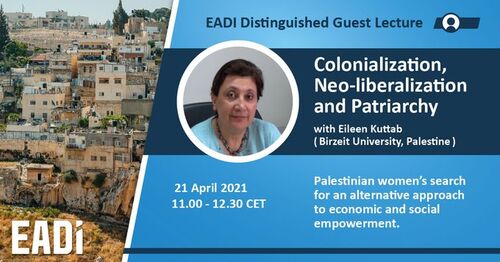Palestinian Women’s Search for an Alternative Approach to Economic and Social Empowerment
with Eileen Kuttab ( Birzeit University, Palestine)
When: 21 April, 11.00 CET (10am Ireland GMT)
Registration: Register here
This lecture will briefly describe the Israeli colonial project of dispossession and de-development on occupied Palestine, followed by a discussion on the emerging Palestinian Authority (PA) and its impact on the economy through a gender lens.
Development choices have been governed by different objectives, namely stabilization of the peace process, control of the Israeli economy over the territories and the mainstreaming of neoliberal economics, resulting in multi-faceted socio-economic deteriorations.
The talk will explore how and why women were disempowered in the Palestinian labour market, and how their role in the national economy was affected. It will also reflect on how and why productive sectors came to be neglected, in the context of a patriarchal society biased towards unskilled male labour. Finally, it will highlight alternative development models, featuring examples of women who challenged and resisted the mainstream narrative of development. Effective alternative models will be presented, together with concepts used to empower people towards independence and liberation, such as self-reliance and solidarity.
Eileen Kuttab is an academic and activist, currently Associate Professor in Sociology and a founding director of the Institute of Women Studies at Birzeit University in Palestine. She is also a founding member of the Arab Council for Social Sciences (ACSS) and heads the focal point of the ACSS in Ramallah, Palestine.
Her research interests and publications focus on feminism and nationalism, social movements (especially the Palestinian women's movement), critiques of mainstream gender and development, and the contextualization and ‘palestinization’ of the concept of women’s empowerment under colonialism. As an activist, she has served on different boards of women’s grassroots organizations, development institutes and human rights organizations. She was the first and only women in Palestine to be elected as head of the Union of Faculty and Employees at Birzeit University, successfully integrating gender issues in the university’s administrative framework.
